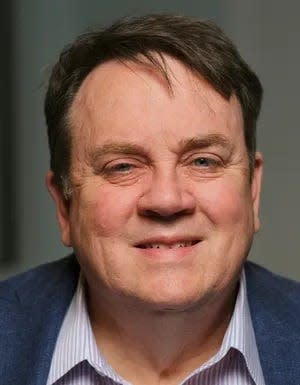Minister: For the state to kill Jemaine Cannon is not justice, it is cruelty
Editor's note: To read more about this story, go to https://tinyurl.com/2s3tbcnm.
Eight men have been executed in Oklahoma since executions resumed in 2021. I have been to the clemency hearings for all eight men and for Jemaine Cannon, who is scheduled to be executed on July 20. All but one of these men were verbally and physically abused by their parents and stepparents. Not just an occasional swat but repeated beatings over several years.
The juries heard this mitigating evidence only at the Stage 2 sentencing stage. Capital cases are heard in two stages: The jury determines guilt or innocence in Stage 1 and fixes a sentence in Stage 2. None of the eight men testified at trial and their lawyers called no witnesses in Stage 1. The jurors already had framed the men as murderers in their mind’s eye by this point. They must be evil. Overcoming this frame and trying to present mitigating evidence in Stage 2 proved to be an insurmountable obstacle for all eight men.
It is a failure of imagination. It is hard for anyone who grew up in middle-class homes with stable and loving parents to imagine the trauma these men suffered as children and the role it played in their violent lives. We cannot imagine how a normal human being could act that way.
The home background and childhood upbringing of the men is not normal. Violence is how these men were conditioned to respond in stressful situations.
Jemaine Cannon’s mother and stepfather physically abused him over his entire childhood, until he was big enough to defend himself at age 13. The record shows that he suffers from complex Post Traumatic Stress Syndrome and paranoid schizophrenia. Cannon told a police investigator before he was arrested that he had just snapped.
The victims in the eight executions were eight women, two children and three elderly people. The juries and the Pardon and Parole Board gave great weight to the vulnerability of the victims but didn’t give any consideration to the vulnerability of the men they condemned.
They act as if it was their free choice. They ignore the reality that social forces contributed to these tragedies. Evolving standards of justice give more weight to the role of social forces in human behavior. The trials were held in the 1990s, at the height of the Law and Order movement that led to America leading the world in mass incarceration. Hopefully, we have learned more about human behavior since then.
Today we should look at what drove the men to commit these crimes. We still hold them accountable for their homicides, but we temper justice if we understand them better. The jurors never had a chance to understand them.
One of the symptoms of PTSD is avoidance of memories and avoidance of external reminders. That could help explain Cannon’s unwillingness to express remorse.
In a more humane justice system, Cannon would receive treatment for his PTSD and his paranoia. About one half of the men and women in prison in Oklahoma have mental health problems. Yet, funding for mental health goes down. Our administration would rather give tax cuts than treat the mental illnesses of its citizens.
Today Cannon is nearly blind and deaf because of sarcoidosis, an autoimmune disease that is treatable. Cannon’s blindness and deafness is partly attributable to the state’s failure to treat his sarcoidosis.
Cannon has been incarcerated on death row since 1996. Justice was achieved when he was tried and convicted. I wonder how many of us could endure a week on death row, let alone 27 years. And he has not only endured, but he also has been a model prisoner.
We should not execute Jemaine Cannon, who is virtually blind and deaf and likely to die within a year. The state should admit its own culpability in failing to treat him. For the state to kill him is not justice; it is cruelty to the least of these.

The Rev. Don Heath has been minister of Edmond Trinity Christian Church (Disciples of Christ) since 2007 and a practicing oil and gas attorney in Oklahoma City since 1982. He has served as the chair of the Oklahoma Coalition to Abolish the Death Penalty for six years and was in the chamber as clergy for Donald Grant and James Coddington during their executions.
This article originally appeared on Oklahoman: Minister: We should look at what drove the men to commit these crimes
